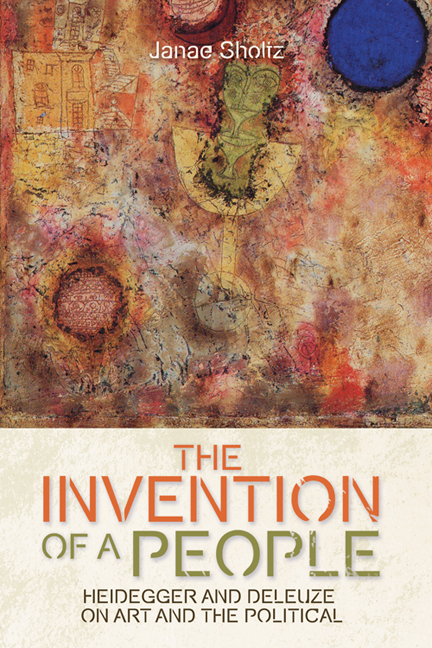Book contents
- Frontmatter
- Contents
- Acknowledgments
- Abbreviations
- Introduction: The People Are Missing
- PART I DIVERGENCE, THE POINT OF NIETZSCHE
- PART II (UN)THINKING, WHAT MUST BE THOUGHT
- Introduction to Part II
- 3 Heidegger on Art and Ontology
- 4 Deleuze on Art and Ontology
- PART III (UN)EARTHING A PEOPLE-TO-COME
- CONCLUDING EVENT
- Index
4 - Deleuze on Art and Ontology
from PART II - (UN)THINKING, WHAT MUST BE THOUGHT
Published online by Cambridge University Press: 05 August 2016
- Frontmatter
- Contents
- Acknowledgments
- Abbreviations
- Introduction: The People Are Missing
- PART I DIVERGENCE, THE POINT OF NIETZSCHE
- PART II (UN)THINKING, WHAT MUST BE THOUGHT
- Introduction to Part II
- 3 Heidegger on Art and Ontology
- 4 Deleuze on Art and Ontology
- PART III (UN)EARTHING A PEOPLE-TO-COME
- CONCLUDING EVENT
- Index
Summary
Axelos Plateau: From Earth to the Cosmic
I feel myself tremble, the old earth, on me who am more and more yours! The earth melts
We interpret Deleuze's claim that Heidegger got the wrong people and the wrong earth as pertaining to the deepest elements of their philosophies, specifically to the radical transformation they effect in the nature of ontology. From his initial considerations of ontological difference, Heidegger develops a discourse of the truth of beyng characterised by the duality of unconcealing openness, manifesting as world, and an irreducible concealedness, an impenetrability figured through earth. We claim Deleuze's affinity for the cosmic as a rejoinder to these ontological figures. The cosmic invokes an ontology of pre-individual forces and becomings, an ontology of the (micro)cosmic as an elementality that prefigures the appearing of world and earth.
Readers of Heidegger may too hastily dismiss Deleuze on this point, given that, for Heidegger, cosmos indicates merely an aggregate of planetary beings which he opposes to the significance of world. For this reason, we insist upon the distinction between cosmos and the cosmic. The cosmic is also opposed to classical notions of cosmos as a beautiful unity composed according to a superior principle of order, as in Plato's Timaeus, or as an indicator of universal humanity, as in Kantian cosmopolitanism. Rather, it is the impersonal, inhuman level of force and flows, a constant flux of matter-energy. The cosmic indicates the priority of the abyss, a perpetual ungrounding. The cosmic mobilises the intensive micro-features that rupture the earth, sanctioning imaginative projections beyond the earth which open onto the universe: ‘child of this earth; yet also child of the Universe; issue of a star among stars’. The cosmic signals those processes that create order out of chaos to create cosmoi – a bridge or milieu.
In his late philosophy, Heidegger does introduce a new concept, the planetary, which could be seen as an intermediary in moving us from earth to the cosmic. Extending beyond ‘world’ as culturally and linguistically immanent, Heidegger appeals to the planetary, seemingly as a positive future path for thinking:
[we are] obliged not to give up the effort to practice planetary thinking along a stretch of the road, be it ever so short.
- Type
- Chapter
- Information
- The Invention of a PeopleHeidegger and Deleuze on Art and the Political, pp. 125 - 188Publisher: Edinburgh University PressPrint publication year: 2015



